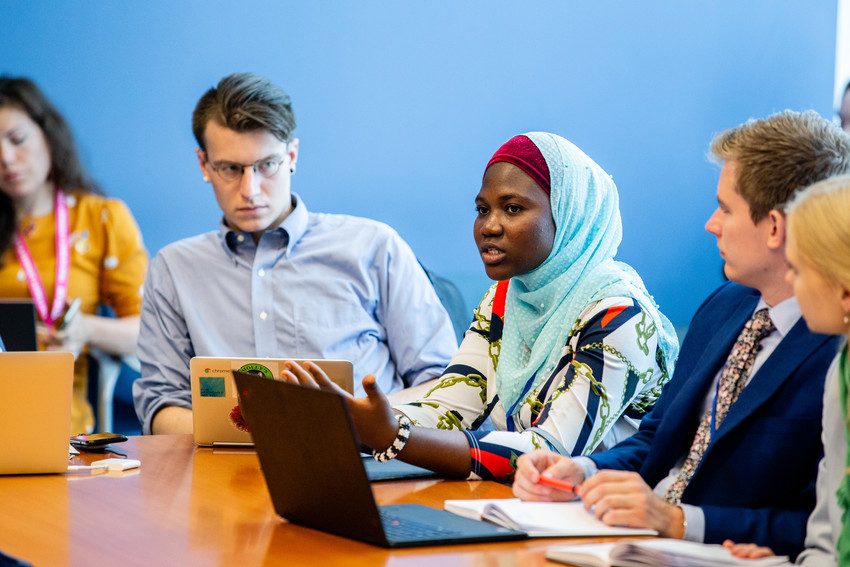3 Things the UN Can Change Now to Promote Meaningful Youth Participation
22 April 2021How to create inclusive and safe spaces for young people’s voices to be truly taken into account in human rights processes.

by Anya Gass
I think sometimes there is a mindset that youth activism should be limited to informal spaces. It’s OK for young people to mobilize in the streets and on social media (although not too loud or disruptive!). Adults on the other hand are making social change in the conference rooms and board rooms, where decisions are being made. The adults might consult young people to ask what they want, what is important to them. But then the door to that conference room is shut and young people are asked to remain outside while the “real work” is done.
But young people are asking for more. They are telling us that they are capable of more and that they have the right to more. What young people are asking for is meaningful participation. They are asking for their participation in decision-making processes not to be limited to consultations or one-off speaking engagements, but to be systematic and institutional. Simply be part of how things are done. The UN and its human rights mechanisms has the opportunity to be a leader in this space. But in order to do so, governments and international institutions need to seriously rethink how things are done and be ready to shake existing structures and ways of working.
I once heard someone used the analogy of a car. It has 4 wheels each of which has important functions of the car (steering, transmission). You can add a 5th wheel but it doesn’t change anything unless you’ve built important functions into that additional wheel. The idea is that if we do youth participation as an add-on, without important functions for decision-making built into it, it doesn’t change anything and remains cosmetic. We need to be bold and think creatively about how to create inclusive and safe spaces for young people within the UN and its processes, that address barriers related to gender, ability and other factors. I share with you a quote from 22-year-old Greta from Germany.
“I’m not here so you can check youth participation off your list…Instead we demand to be treated as equals in every social, political and economic context…We demand that youth participation becomes a part of governmental institutions…I’m sick of not being taken seriously…I don’t need people to be happy about me having an opinion. I need them to take it into account.”
So here are three things governments and UN agencies in Geneva can do now to create those inclusive and safe spaces for young people’s voices to be truly taken into account in human rights processes:
1. THE HUMAN RIGHTS COUNCIL SHOULD INCLUDE A YOUTH SPEAKER AT EVERY PANEL.
The Human Rights Council has already made significant progress to increase gender parity in panels (for example, check out the International Gender Champions initiative), and to take gender equality into account in all of its work. But the Council and UN agencies need to take the next step: take an intersectional approach by adding age and diversity to the gender dimension. Including a youth speaker can be tokenistic if it’s simply done to tick the youth participation box. But it can be an important first step in changing mindsets on youth as true experts on their areas of work.
2. THE HUMAN RIGHTS COUNCIL SHOULD CHANGE THE MANDATES OF ITS INDEPENDENT EXPERTS TO INCLUDE AN AGE DIMENSION.
Modifying the mandates of Special Procedures Mandate Holders is a very good (and easy!) way to institutionalize young people’s meaningful participation in human rights mechanisms and processes. When these independent experts are required not only to take an age dimension into account in their work but also consult systematically with young people, it means that their engagement with young people becomes ongoing and sustainable, rather than one-off or tokenistic. There are already a few good examples of this, such as the Working Group on Discrimination Against Women and Girls and the Special Rapporteur on the environment.
3. STRENGTHEN REPRESENTATION OF YOUTH IN POLICY-MAKING PROCESSES OF THE HUMAN RIGHTS COUNCIL
There are a few ways this could be done. One idea is to set up Youth Delegate programmes, where national delegations to the Human Rights Council include one young person who participates in policy negotiations on an equal footing to other delegates. Some governments are already doing this. But it could be expanded and guidance could be developed on what is needed to make those programmes more meaningful and inclusive.
Another idea is to establish an annual Youth Forum just before one of the regular Human Rights Council sessions. Again a number of elements would need to be in place to ensure that this type of Forum is meaningful, including making sure it feeds into existing policy-making processes. For example, this Forum could provide recommendations and language on specific resolutions that are upcoming, or secure commitments from Member States to champion certain issues or language during negotiations.
Changing our way of working isn’t easy. It requires us to give up some of our power to make space for others. It may be uncomfortable. But it is essential if we want our institutions to remain relevant. And young people have the right to have a seat at the table. Let’s make that happen.
This blog is adapted from Plan International’s speech at the Human Rights Council’s Intersessional Seminar on Youth, which took place on 12 April 2021
Categories: Youth empowerment


